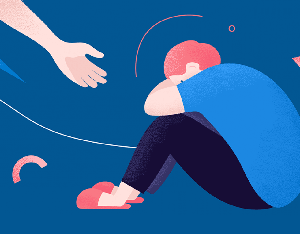How to Manage Anxiety – English for Psychology with a video to improve listening, selected text for reading practice and illustrated flashcards inside the text
Source of image: https://www.calmclinic.com/
Listening practice
Reading practice
What is anxiety?
Anxiety involves feelings of worry, fear, and apprehension. Anxiety is typically experienced on cognitive, emotional, and physical levels. For instance, when feeling anxious a person may have negative or disturbing thoughts.
Source: https://www.verywellmind.com/
Generalized anxiety disorder
Generalized anxiety disorder includes persistent and excessive anxiety and worry about activities or events — even ordinary, routine issues. The worry is out of proportion to the actual circumstance, is difficult to control and affects how you feel physically. It often occurs along with other anxiety disorders or depression.
Panic disorder
Panic disorder involves repeated episodes of sudden feelings of intense anxiety and fear or terror that reach a peak within minutes (panic attacks). You may have feelings of impending doom, shortness of breath, chest pain, or a rapid, fluttering or pounding heart (heart palpitations). These panic attacks may lead to worrying about them happening again or avoiding situations in which they’ve occurred.
Source: https://www.mayoclinic.org/
Anxiety cycle
Some people tend to be more prone to anxiety, often due to upbringing or genetics, but there are also other factors at work that can contribute to the anxiety cycle. Anxiety can persist and even grow worse because of the ways people respond to their worries. Individuals with untreated anxiety problems tend to respond to their fears by trying to suppress the worry, seek reassurance that nothing bad will happen, or avoid situations that might trigger the fear. These strategies can backfire and reinforce anxiety, thus creating a cycle.
Source: https://www.verywellmind.com/
Stimulating vagus nerve
While we know the vagus nerve has many functions, we’re not always completely sure how it works. What we do know: It’s a key player in the parasympathetic nervous system. The more we stimulate the vagus nerve (by deep breathing, for example), the more we enhance the calming effects of the parasympathetic (or “rest and digest”) nervous system and counter the stimulating effects of the sympathetic (or “fight or flight”) nervous system.
Take a cold shower.
Consider ending your shower with a one-minute blast of cold water, and don’t be afraid to head outside for a walk when it’s chilly. Studies show that acute cold exposure activates the vagus nerve, as well as various neurons on the vagus nerve pathway, causing a shift toward parasympathetic nervous system activity.
Source: https://www.mindbodygreen.com/
Practice breathing and meditation
The next time your anxiety starts to take you out of the present, regain control by sitting down and taking a few deep breaths. Simply stopping and breathing can help restore a sense of personal balance and bring you back to the present moment. However, if you have the time, try taking this activity a little further and experiment with a breathing exercise.
Source: https://www.verywellmind.com/
Stay away from sugar
It may be tempting to reach for something sweet when you’re stressed, but that chocolate bar can do more harm than good, as research shows that eating too much sugar can worsen anxious feelings. Instead of reaching into the candy bowl, drink a glass of water or eat protein, which will provide a slow energy your body can use to recover.
Source: https://www.webmd.com/




Managing anxiety is an important matter. Because it has an impact on our mental and physical health. Moreover, it affects our relationships and quality of life. Therefore, we should pay more attention to the methods of reducing anxiety.
You’re absolutely right. Managing anxiety and stress, especially in modern life, is of utmost importance. As you correctly mentioned, a great deal of mental and physical diseases are rooted in uncontrolled anxiety.
Feedback
The first two sentences had better be revised in this way:
Managing anxiety is an important matter because it has an impact on our mental and physical health.